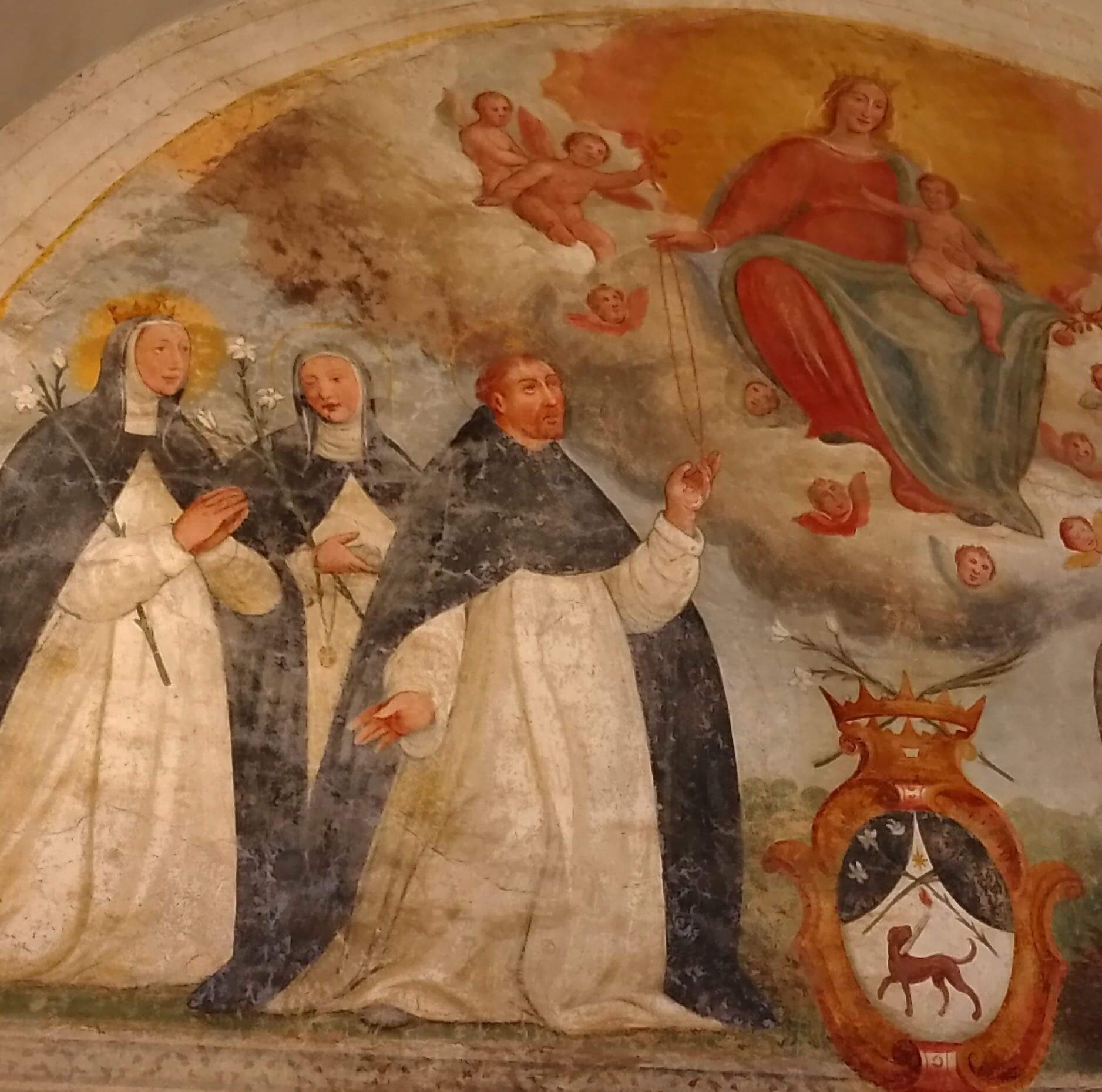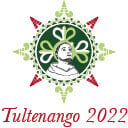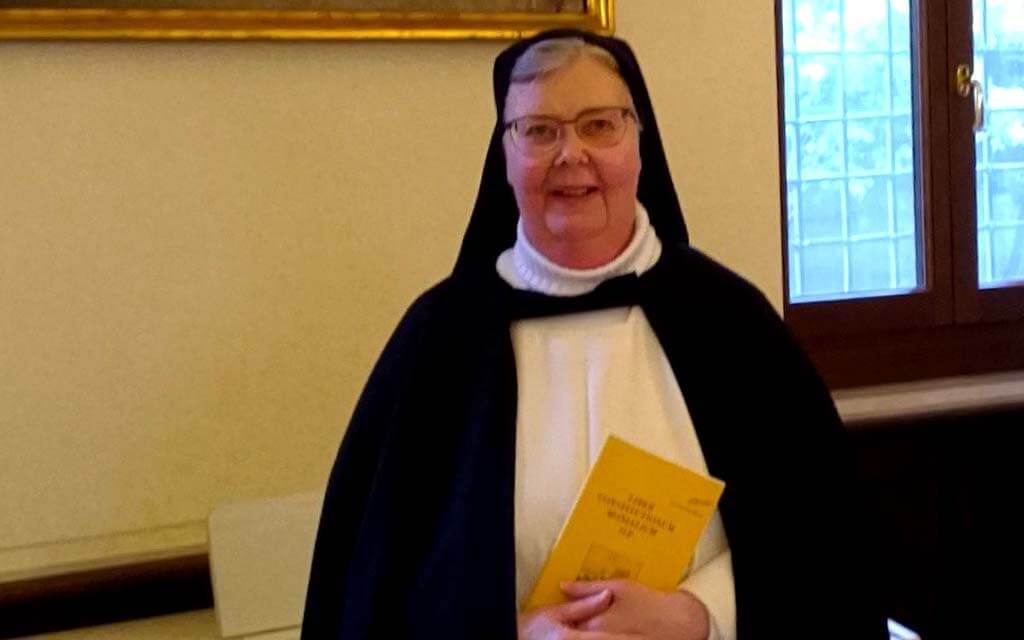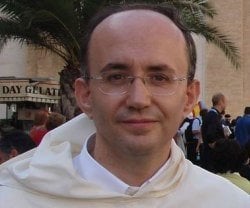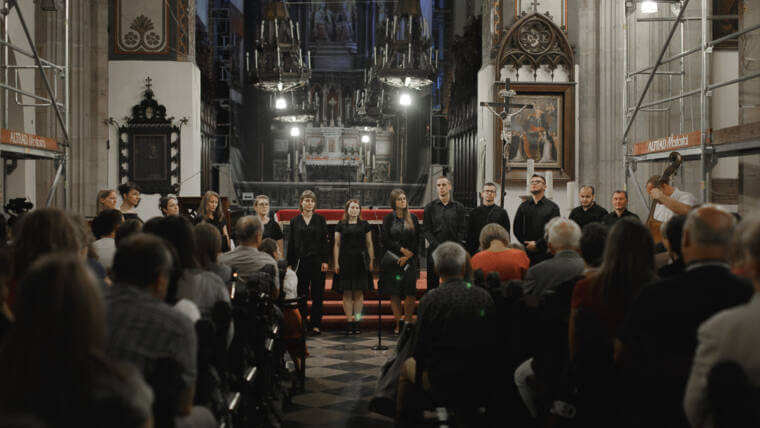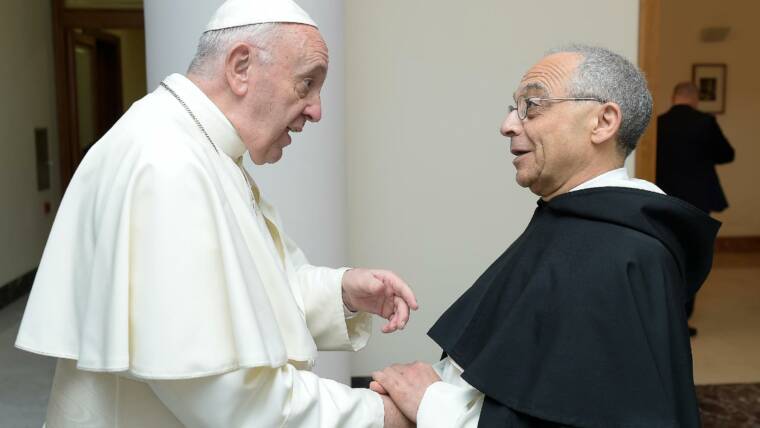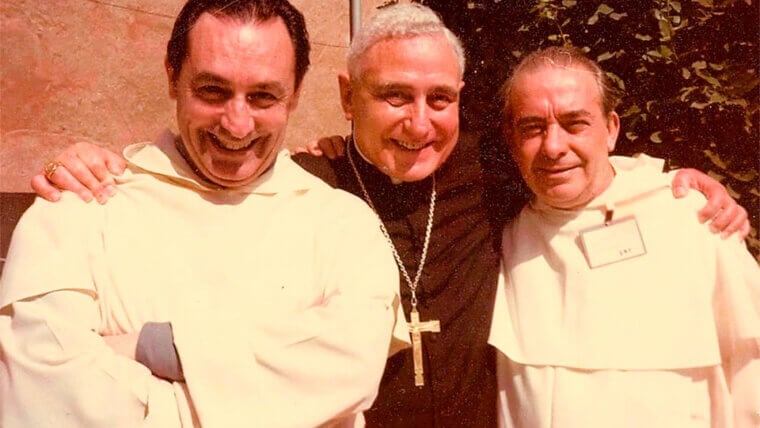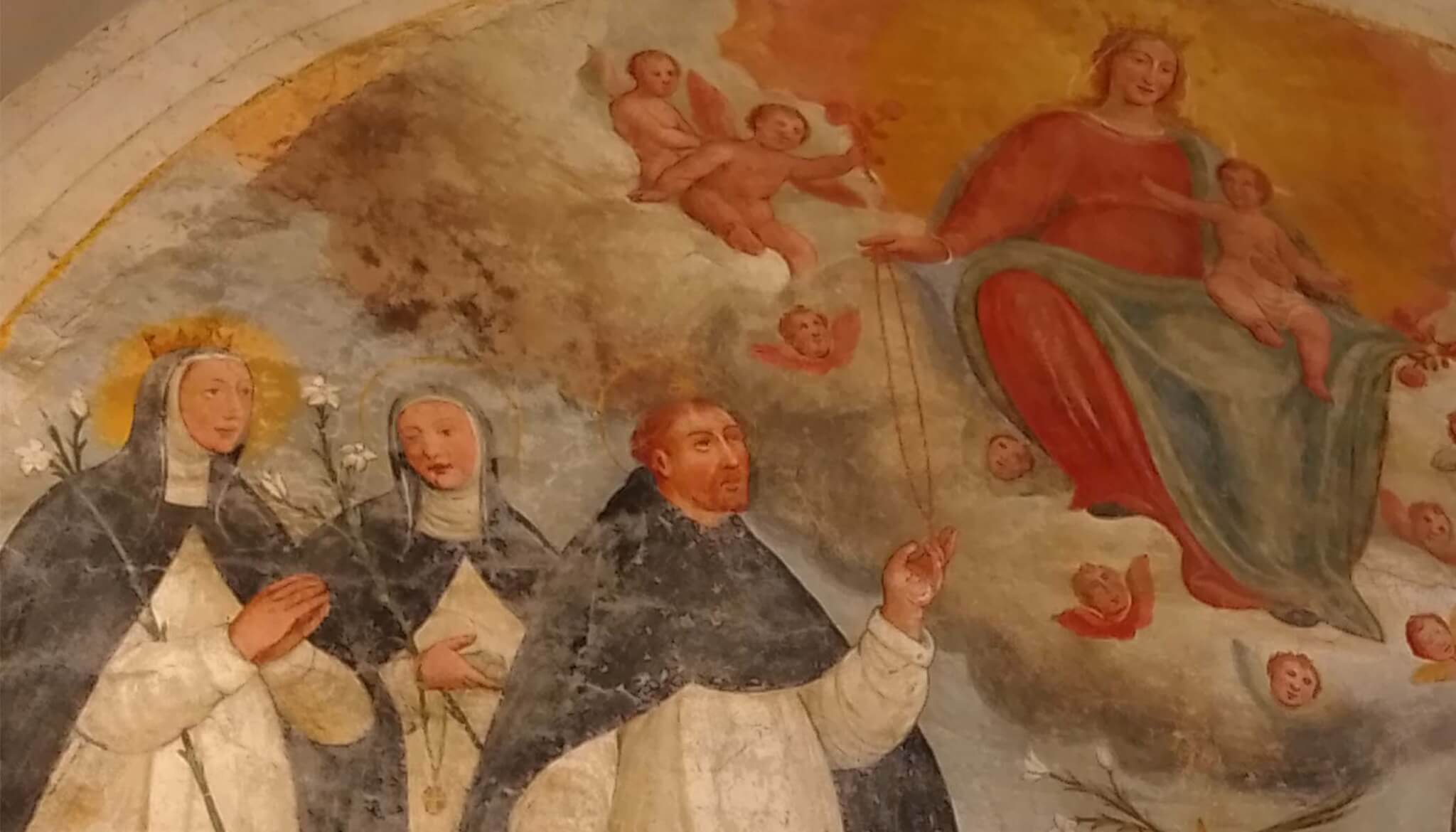
Interview with Sister Pascale – Dominique, OP
Sister Pascale – Dominique is a Dominican nun who explores the theology of the spiritual life. She has written several books. She is currently reflecting on consecrated life in preparation for the Jubilee 2025.
When we talk about the consecrated life, what attractive features would be helpful for a young man or woman considering this vocation?
As a Dominican nun, I will limit myself to talking about what I know from the inside: Dominican monastic life. In our Fundamental Constitution (FC) there are three dimensions which we can invite young and more mature women to consider:
1.) Participation, through life itself rather than words – vita magis quam sermone – in the mission of the Order of Preachers (FC 1 and 2)
2.) A life of interiority, in the image of Mary seated at the feet of Jesus, centred on the assiduous contemplation of Christ the Saviour and listening to His Word (FC 3)
3.) In the fullness of the Spirit, its external extension through fraternal life in the community, in the Order, in the Church and in the world in general, gathered around Mary (cf. Acts 1:14), like the first community in Jerusalem (Acts 2:42) (FC 4).
We can recognise attractive features at all three levels:
The first is participation in the mission of the Order which is to transmit the proclamation of the Life which Christ the Saviour came to give us. We do this through spiritual motherhood, fruitful because of its concrete participation, personal and communitarian, in Christ’s Life and through accompaniment. Monasteries are indeed places where people ask to be supported through prayer and spiritual talks.
The second is the attraction to the interior life of prayer, meditation on Sacred Scripture and “lively and assiduous contemplation of Christ, who is in the bosom of the Father” (FC 3). Along with this primary attraction to the monastic life in general, there is also the appeal of its particular form in the Order of Preachers characterised by the search for truth through study.
The third is the witness of community life, of the “Holy Preaching” (FC 1) which is manifest above all through the understanding of the sisters and their joy in being together, expressed in a particular way in community prayer.
From these three characteristic aspects of Dominican monastic life emerge a number of concrete points which may be of particular interest:
- exercising spiritual motherhood by passing on life, caring for others and helping others to grow towards fullness in the life of Christ;
- the discovery and development of personal gifts – artistic, musical, intellectual, gifts of dialogue, of consolation, etc. – so as to put them at the service of the community, the Order, the Church and the surrounding world;
- and finally, community life, which is a solid support for the personal spiritual life and bears witness to the communion achieved by the Holy Spirit in the Body of Christ.
Is the theology of consecrated life in the Dominican tradition still relevant today?
The attraction of the interior life of prayer, meditation on the Scriptures, contemplation and study, the witness of community life in the “Holy Preaching” alongside our brothers, our apostolic sisters and the laity of the Order, and participation in the mission of the Order is ever-present. Indeed, all this will be necessary for as long as humanity’s pilgrimage on this earth lasts.
In fact, these are characteristics that all Christians and the whole Church “on the move” (as Pope Francis says) are called to live. On this point, a word from Saint Paul comes to mind:
I ask you in the name of God and of Christ Jesus, who is to come to judge the living and the dead for he will appear and reign. I ask you: proclaim the Word, insist in season and out of season, convince, command, and encourage, always with patience and teaching (2 Tim 4:1-2).
But it is up to us to be leaders and witnesses at every level.
Can the theological approach to Dominican consecrated life contribute much, for example, to ecclesial communion, the synodal journey and other themes?
In this way, by being leaders and witnesses, we can contribute in our own way, that is to say as Dominican nuns, to ecclesial communion, rooted as we are in the tradition of Saint Augustine and linked through it to the first community of Jerusalem to which the first chapters of the Acts of the Apostles bear witness.
Our very form of life is a form of participation. To explain this, I would like to quote the apophthegm of a Desert Father. Let us remember that alongside the tradition of Saint Augustine, our Father Saint Dominic encouraged us to follow the path of Saint John Cassian and the Desert Fathers:[1]
Theophilus, the bishop of Alexandria, of holy memory, came one day to Scété. The brothers gathered together and asked Abba Pambo to say a few words to the bishop to edify him. But the bishop replied: “If he is not edified by my silence, he will not be edified by my words” (Theophilus, 2).
Perhaps our best witness is our silence – a silence filled with the loving contemplation of Christ and listening to His word – because it is there, in silence, that the word that we can say or write is born. It is a tamed silence, so to speak, because being in silence is a trial for many people, and we must first learn to find its meaning for the cultivation and growth of our inner life. Silence thus becomes the place for listening, listening to God, listening to the Holy Spirit, listening to others, listening to the voiceless[2] (who are sometimes our own brothers and sisters in the Order), without the intervention of our own inner word, which judges, questions, pronounces itself, before the other has finished speaking.[3] But then, we can and must intervene, to share our own experience, good and not so good, our reflections nourished by the study and meditation of the Bible and our own spiritual tradition, and to put forward our questions and suggestions.
How do you see the next Jubilee of Consecrated Life (2025)?
This Jubilee will be a time “characterised by the forgiveness of sins and, in particular, by the indulgence that is the full expression of God’s mercy”, as Pope Francis reminds us in his letter to Archbishop Fisichella, President of the Pontifical Council for the Promotion of the New Evangelisation, and under the theme “Pilgrims of Hope”, the hope of a new life opened up by God’s mercy. This could, of course, be a time to question ourselves about our lack of hope and our refusal to renew our lives. It can also be a time to review our lives and revisit the paths we have travelled in our efforts to implement the continual aggiornamento called for by the Second Vatican Council[4] in order to become, as nuns, bearers of hope characterised by faith and a love open to all.
What would you like to say to the Dominican family around the world?
With this in mind, I would like to share some reflections and wishes that have arisen in me as a result of my experience – unusual and singular for a nun, but for which I am deeply grateful to the Lord and to my superior brothers and sisters. My almost 40 years in the Order have taken me from the monastery of Étiolles, near Le Saulchoir, to the monasteries of our Order in Germany, Switzerland, Belgium, Norway, Spain, Poland, Italy, and finally to the “Matris Domini” monastery in Bergamo, where I have been for the last two years. I also participated in the “International Meeting on Dominican Monastic Life” at the monastery of Herne, Belgium, in 1996 under the aegis of ESPACE. This was with the encouragement of the Master of the Order Brother Timothy Radcliffe, OP and the participation of Bishop Pierre Raffin, OP. In addition, since 2010, I have served as translator for various ecclesiastical and religious entities in Rome.
I realised that many changes had been made, all with the sincere desire for the Order to respond to the challenges of the modern world. But the aggiornamento in the sense of a return to the sources has not taken place for a variety of reasons. One reason was the lack of texts -for example, under the communist regime in Poland, there was a total lack of texts. Another was a lack of time, as it was necessary to earn a living. A third reason was that the texts were edited and commented on by historians who did little to highlight their spiritual value.
Of course, historical studies are invaluable for learning about the origins of the Order. But it seems to me that, now that the essential texts[5] are accessible in almost every language, we need to study them to find their sapiential sapience. Once we do so, it will be possible to draw up a new cura monialium – a kind of “pastoral care” for Dominican monastic life, with the help of everyone in the Dominican Family, including the nuns themselves.[6] If we do not do this, I fear that the prediction made by our Promoter in 2009 will come true: all the monasteries of the Order in Europe will close in the next few decades. If, however, we rediscover this sapiential sapience and if we nourish ourselves with it,[7] we will be able to present clearly our identity as Dominican nuns,[8] our own charism within the Order of Preachers, and arouse ardent and persevering vocations. For our vocation is truly beautiful! And it is still relevant today.
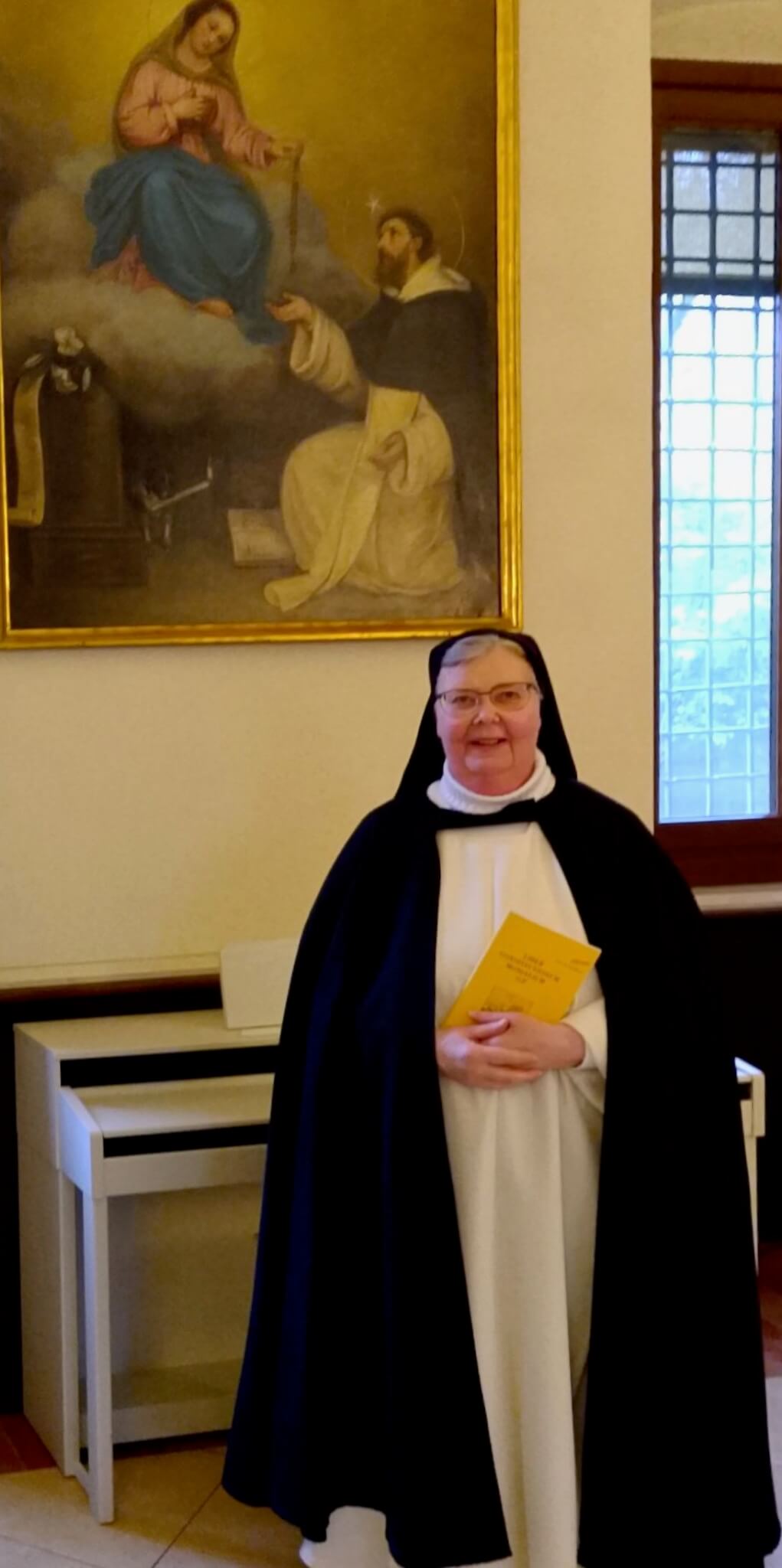
In describing herself, Sister Pascale-Dominique, OP, says:
I am 66 years old and I made my profession in the monastery of Evry in 1989. I then lived in Lourdes and Spain before being called to Rome, where, for ten years, I worked as a translator for the Curia of the Order of Preachers and for more than 12 years for the UISG and various Vatican dicasteries, starting with the Pontifical Council for Justice and Peace. In 2021, I obtained a Certificate in Spirituality at the Institut Catholique de Toulouse and, this year, 2024, a Master’s degree in Spiritual Theology at the International Dominican University of DOMUNI. My thesis work for the latter focused on the Readings of John Cassian, with a view to updating religious life and a new French translation of the Readings which will be published in the next few weeks by the Swiss publisher ‘Parole et Silence’.
[1] Cf. the Rule of Saint Sixtus, no. 5, then Jordan of Saxony, Libellus, no. 13, quoted in the Fundamental Constitution.
[2] Cf. “Un Synode de l’écoute, prompt à la surprise”, interview with Fr Christoph Theobald sj: www.jesuites.com.
[3] Cf. Elzbieta Sujak, L’initiation de la psychologie de la communication, 2021.
[4] The idea of aggiornamento was born at Le Saulchoir in the pre-conciliar period; it is therefore part of our Dominican heritage and deserves special attention. For more details, see Marcellino d’Ambrosio’s article, “La théologie du ressourcement, l’aggiornamento et l’herméneutique de la tradition” (active link).
[5] The first of these is the Fundamental Constitution, followed by the texts on which it is based: the Libellus of Jordan of Saxony, the Rule of Saint Sixtus – written by Saint Dominic himself – the Lectures of Saint John Cassian and the Rule of Saint Augustine.
[6] Some useful works on the Rule of Saint Augustine already exist: the community of the monastery of Orihuela, Spain, has published a book entitled Santas y Beatas de la Orden de Predicadores (1207-2007); there are several books on Blessed Agnès de Langeac. In a few weeks my translation of Saint John Cassian, Entretiens I-X avec les Pères de Scété will be published by Parole et Silence, and I am currently working on the spiritual foundations of our Fundamental Constitution. A sapiential reading of the Libellus would be welcome. It would be useful to compile a bibliography of works on spirituality that have a direct bearing on Dominican monastic life.
[7] With the exception of the German-speaking regions and neighbouring Alsace, where the Rhenish mystics are prized, spiritual nourishment is often sought outside the Order. Thérèse of the Child Jesus seems to be the most widely read author in our monasteries in Europe.
[8] I say this remembering a Carmelite nun who asked one of our nuns about the identity and charism of her monastery; she replied: “Oh, it’s like a little Carmel”. Some ten years earlier, in the 1990s, a sister from the International Commission of Nuns stopped off at our monastery in Evry on her way back from one of their meetings; she said that one of the problematic themes discussed was precisely our identity.
